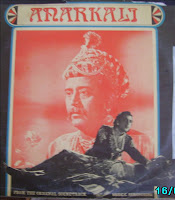
In my last post I was recalling the Music of Hemant Kumar, the great singer and music director from Bengal. Hindi film music had seen another highly talented singer from Bengal, Subir S
 en, who burst into the scene with the the evergreen song, 'Manzil wohi hai pyar ki' from film 'Kath Putli' in the year 1957. The film with music by Shankar-Jaikishen had several lilting melodies including Lata's 'Bole re kathputli' in it; but the most popular at that time was "Manzil wohi' by Subir Sen. What caught the attention of the listeners was the fresh, soft, sweet voice of the singer which, to some extent, resembled that of Hemant Kumar whose several songs were very popular and frequently heard over the radio those days. Listeners found the voice and style of singing refreshingly different from the large number of songs(male voice) of Rafi, Mukesh and the rest. Subir Sen, I remember, had received a lot of critical acclaim for this song and pundits were predicting a bright future for him in the Hindi film industry.
en, who burst into the scene with the the evergreen song, 'Manzil wohi hai pyar ki' from film 'Kath Putli' in the year 1957. The film with music by Shankar-Jaikishen had several lilting melodies including Lata's 'Bole re kathputli' in it; but the most popular at that time was "Manzil wohi' by Subir Sen. What caught the attention of the listeners was the fresh, soft, sweet voice of the singer which, to some extent, resembled that of Hemant Kumar whose several songs were very popular and frequently heard over the radio those days. Listeners found the voice and style of singing refreshingly different from the large number of songs(male voice) of Rafi, Mukesh and the rest. Subir Sen, I remember, had received a lot of critical acclaim for this song and pundits were predicting a bright future for him in the Hindi film industry.He followed it up with several hit songs for Shankar-Jaikishen like, Aajare aaja' in Roop ki Raani Choron ka raja', 'Gagan ke chanda' with Lata in Apne hue Paraye,Dekho na jaao ae jaan-e-man' of film Boy Friend and the beautiful duet with Lata,viz., 'Main rangeela pyar ka rahi' from film Chhoti Bahen in which we could see the subdued but pleasant voice of Subir Sen gelling p
 erfectly with the versatile voice of Lata to create a great duet sung in gay abandon. He also sang notable songs for several other leading Music directors during the period.For kalyanji Aanandji there is the song,'Sun ja dastan yan na sata' in film Passport. For Vasant Desai, he sang, ' Pyar ne Milna sanam' with Aarti Mukherjee in film Ardhangini. In film, Hum bhi Insaan hai', Hemant Kumar composed the popular duet of Subir sen with Geeta Dutt,viz., 'Gori tere natkat naina'. For lesser known music directors also he sang outstanding songs. For example, for Robin Bannerjee, he sang the soulful,'Humein un rahon pe chalna hein jahan girna aur sambhalna hai' in film Masoom(1960), along with Aarti Mukherjee. And there is the duet with Aasha in film Mehlon ki quaab',
erfectly with the versatile voice of Lata to create a great duet sung in gay abandon. He also sang notable songs for several other leading Music directors during the period.For kalyanji Aanandji there is the song,'Sun ja dastan yan na sata' in film Passport. For Vasant Desai, he sang, ' Pyar ne Milna sanam' with Aarti Mukherjee in film Ardhangini. In film, Hum bhi Insaan hai', Hemant Kumar composed the popular duet of Subir sen with Geeta Dutt,viz., 'Gori tere natkat naina'. For lesser known music directors also he sang outstanding songs. For example, for Robin Bannerjee, he sang the soulful,'Humein un rahon pe chalna hein jahan girna aur sambhalna hai' in film Masoom(1960), along with Aarti Mukherjee. And there is the duet with Aasha in film Mehlon ki quaab','Gar tum bulana manon' composed by S. Mohinder.
But of all the music directors , Shankaer -Jaikishen gave the best solo songs to Subir Sen
 as again evidenced by the song,'Dil Mera ek Aas ka Panchi' in film Aas ka Panchi apart from a duet with Lata, Dheere Chalo zara''. The scene in the film, picturised on Rajinder Kumar as an Army cadet releasing a white dove in the sky is still fresh in my memory. This again was a song celebrated in the campuses in early 60s.
as again evidenced by the song,'Dil Mera ek Aas ka Panchi' in film Aas ka Panchi apart from a duet with Lata, Dheere Chalo zara''. The scene in the film, picturised on Rajinder Kumar as an Army cadet releasing a white dove in the sky is still fresh in my memory. This again was a song celebrated in the campuses in early 60s.But inspite of several hit songs under the top composers, especialy ShankarJaikishen, Subir Sen could not scale the heights expected of him in Hindi film music. Music directors preferred to use him more to sing duets than solos, may be, because of the stranglehold of singers like Rafi, Mukesh, Talat and Kishor in the field of playback singing during the period. Subir Sen's, apparent, limited range also might have contributed to this. But more than these, the peculiar 'politics' of the industry which could easily sideline gifted singers like Jesudas and Vani Jairam might also have worked against Subir sen. Allegations were made that Mahendra kapur copied Rafi. Suman Kalyanpur was branded as poor people's Lata. The similarity of Subir Sen's voice to that of Hemant Kumar was held against him. These were the ways of the industry. In short, this gifted singer faded from the scene to become highly successful in Bengali music expecially Rabindra Sangeeth.








